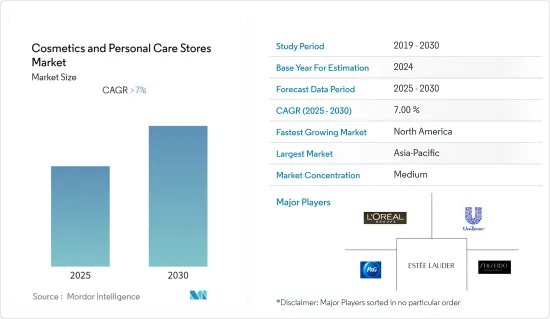PUBLISHER: Mordor Intelligence | PRODUCT CODE: 1636086

PUBLISHER: Mordor Intelligence | PRODUCT CODE: 1636086
Cosmetics and Personal Care Stores - Market Share Analysis, Industry Trends & Statistics, Growth Forecasts (2025 - 2030)
The Cosmetics and Personal Care Stores Market is expected to register a CAGR of greater than 7% during the forecast period.

Direct-to-consumer (DTC) brands and eCommerce had become a way for sellers to sell their products successfully, and cosmetics and personal care stores started using this method of marketing.
With the advent of COVID-19, people's movement decreased due to restrictions on gatherings. As the reduction in people's movements and functions was made and parties were minimized during the COVID-19 period, businesses of cosmetic and personal care products, which are used in functions by people, observed a decline in sales. Other than this, people started shifting towards low maintenance and a natural look, with more attention being paid to health, leading to a negative impact on store sales.
As the global outlook recovered from COVID-19, consumer behavior observed a change. Instead of full makeup, people now prefer swipes of lipstick, eyecare, perfumes, and powder, leading stores to focus on specific varieties of products, which are observing an increase in sales. Consumer preference either towards skincare or makeup will further define cosmetics and personal care store sales globally.
Cosmetics & Personal Care Stores Market Trends
Increasing Attention Towards Skincare and Beauty Care Products
The female population around the world accounts for the majority of the cosmetic store industry's revenue. The youth or college-going population makes up a significant portion of them.A new trend has emerged over the years in which middle-aged men and women are searching for products to make them look young, which leads to firms designing and modifying their products as per consumer needs.
As consumers pay more attention to their physical health, better energy, less stress, and a better mood rise to the top as the most important benefits of sleep, overtaking physical benefits. This has led brands across all categories to focus on achieving peak wellness.Good nutrition is linked to good health, so people look for products that will help them look better and feel better about themselves.
Consumers are investing in beauty products as a lifestyle choice rather than due to societal pressure, seeking products that complement their wellness and beauty needs. Concepts of holistic skincare, mindful beauty, and healthy aging are continuously emerging, leading the cosmetic and personal care store market to continuously evolve with consumer needs.
Increased Expenditure on the Use of Body Care and Skincare Products in North America
Consumers in the United States spentmore than USD 9 billion on beauty products in the first half of current year by households. The NPD Group reports that in the past year, sales of beauty products to these customers climbed by 15%. Both an increase in buyers and consumer spending over the previous year with Millennials and Generation X driving most of the increase were responsible for this double-digit growth.
The skincare, fragrance, makeup, and haircare segments of the beauty market brought in is more than 400 USD billion in revenue in the current year. The growing demand from consumers for natural and organic ingredients is one of the main factors propelling the growth of the luxury skincare market. Customers are looking for skincare products with natural and organic ingredients as they become more conscious of the effects these products have on their skin and overall health.
Cosmetics & Personal Care Stores Industry Overview
As cosmetics and personal care products are part of the daily hygiene of users, the cosmetics and personal care market has been adopted globally, with cosmetics and personal care stores' expanding their sales. The stores have always played an important role in the sale of cosmetics and personal care products and are an important determinant when a company makes changes to its products. Loreal, Unilever, P&G, Estee Lauder, Shiseido, Beiersdorf, LVMH, Kao, Coty, and Johnson & Johnson are among the leading players existing in the global cosmetics and personal care market, with their store chains being located globally.
Additional Benefits:
- The market estimate (ME) sheet in Excel format
- 3 months of analyst support
TABLE OF CONTENTS
1 INTRODUCTION
- 1.1 Study Assumptions and Market Definition
- 1.2 Scope of the Study
2 RESEARCH METHODOLOGY
3 EXECUTIVE SUMMARY
4 MARKET DYNAMICS AND INSIGHTS
- 4.1 Market Overview
- 4.2 Market Drivers
- 4.3 Market Restraints
- 4.4 Industry Value Chain Analysis
- 4.5 Industry Attractiveness - Porter's Five Forces Analysis
- 4.5.1 Bargaining Power of Buyers
- 4.5.2 Bargaining Power of Suppliers
- 4.5.3 Threat of New Entrants
- 4.5.4 Threat of Substitutes
- 4.5.5 Intensity of Competitive Rivalry
- 4.6 Insights of Technology Innovations in the Market
- 4.7 Impact of COVID-19 on the Market
5 MARKET SEGMENTATION
- 5.1 By Product Type
- 5.1.1 Decorative
- 5.1.2 Skincare
- 5.1.3 Haircare
- 5.1.4 Perfume
- 5.1.5 Oral-Care
- 5.1.6 Bath & Shower
- 5.2 By Distribution Channel
- 5.2.1 Specialist Retail Stores
- 5.2.2 Supermarket/Hypermarket
- 5.2.3 Convenience Stores
- 5.2.4 Pharmacies/Drug Stores
- 5.3 By Region
- 5.3.1 North America
- 5.3.2 Asia-Pacific
- 5.3.3 South America
- 5.3.4 Middle East & Africa
- 5.3.5 Europe
6 COMPETITIVE LANDSCAPE
- 6.1 Market Concentration Overview
- 6.2 Company Profiles
- 6.2.1 Loreal
- 6.2.2 Unilever
- 6.2.3 P&G
- 6.2.4 Estee Lauder
- 6.2.5 Shiseido
- 6.2.6 Beiersdorf
- 6.2.7 LVMH
- 6.2.8 Kao
- 6.2.9 Coty
- 6.2.10 Johnson& Johnson
7 MARKET OPPORTUNITIES AND FUTURE TRENDS
8 DISCLAIMER AND ABOUT US




